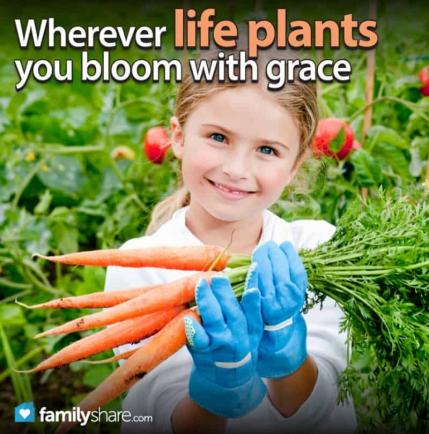
Recently, I took my youngest 6-year-old son to the nursery to help his sister pick some plants for her container garden. She lives in an apartment so we couldn't get a huge amount. Jack was completely mesmerized by all the plants and flowers. He wanted to smell them all, touch them all, and buy them all. He loved helping her pick a few flowers as well as herbs and vegetables. I promised to let him help plant our garden when we returned home.
Children are naturally drawn to plants and things that grow. Their natural curiosity in the world around them allows them to dig right in. Using that natural enthusiasm, you can help your children learn valuable life lessons while growing a garden.
1.
Faith
Whenever you plant a seed you are acting on faith; faith that the seed will germinate, grow, and bear fruit. While planting seeds in your garden, talk with your child about faith and how it relates to planting the seeds. Be sure to plant some seeds that are quick to germinate and bear fruit, such as radishes.
2.
Patience
Gardening requires patience. Seeds do not sprout overnight. It usually takes a couple of weeks to see those first leaves pop through the soil. Teach your children about waiting and having patience. In this world of instant gratification, it is truly important for children to understand the concept that "good things come to those who wait." While you wait, find some books to read about seeds and gardens, such as "The Little Red Hen."
3.
Work
A garden definitely requires effort and work. If you plant seeds yet don't provide water or weed the area around them, the seedlings may not survive or be choked out by weeds. Give your children specific jobs to do, such as watering and pulling weeds. Teach them how to do each job so to be beneficial to your garden. Later jobs will include thinning rows so the plants left behind can have the room they need to grow and bear fruit. Some plants may need to be staked or given a trellis to climb. Take the time to work beside them and talk about what you are doing, and why. Also, let them do much of the work. Some years, our rows have not been very straight. However, our children have loved seeing the seeds they planted grow.
4.
Disappointment
Sometimes, despite lots of work, a garden may fail. One year, we had planted a beautiful garden. We harvested tomatoes and carrots, peppers and other things. The next year, we planted our garden excited for the fresh vegetables we would have that summer. Sadly, the seedlings kept disappearing. We couldn't figure out what was happening. One day as I was working, I watched seedling after seedling being pulled underground. We had a gopher infestation! Sadly, we had no harvest that year. Nevertheless, we did learn a valuable lesson about things not going as planned, something that happens often in life.
As spring brings warmth and longer days, I look forward to getting in the dirt with my boys and planting our garden. Not only will we be harvesting the bounty of the earth, we will be harvesting the bounty of lessons we can apply to our lives.

